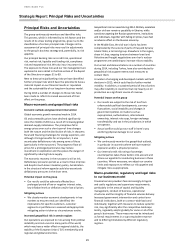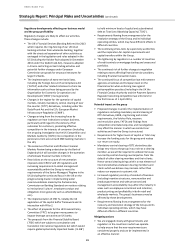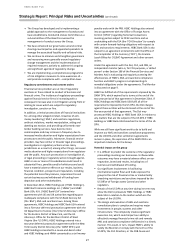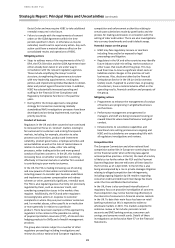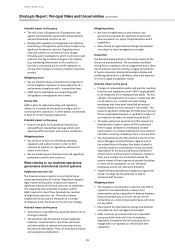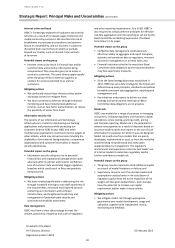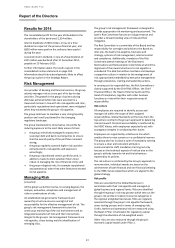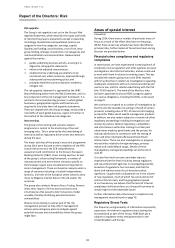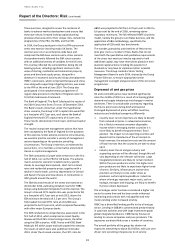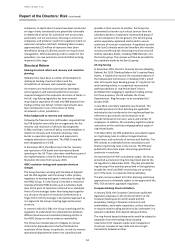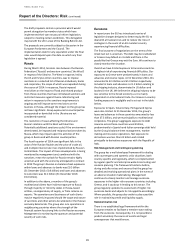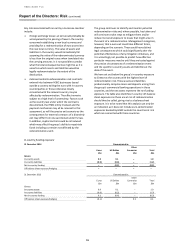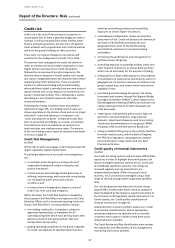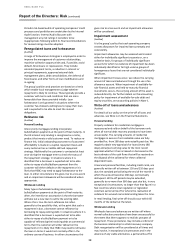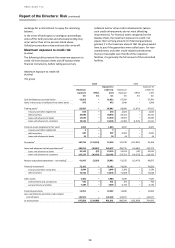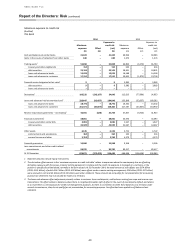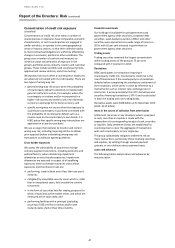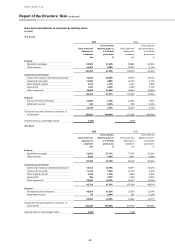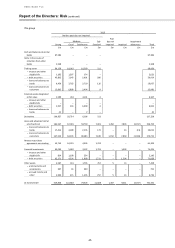HSBC 2014 Annual Report Download - page 37
Download and view the complete annual report
Please find page 37 of the 2014 HSBC annual report below. You can navigate through the pages in the report by either clicking on the pages listed below, or by using the keyword search tool below to find specific information within the annual report.
HSBC BANK PLC
Report of the Directors: Risk (continued)
35
The draft proposals contain a provision which would
permit derogation by member states which have
implemented their own structural reform legislation,
subject to meeting certain conditions. This derogation
may benefit the UK in view of the Banking Reform Act.
The proposals are currently subject to discussion in the
European Parliament and the Council. The
implementation date for any separation under the final
rules would depend upon the date on which any final
legislation is agreed.
Russia
During March 2014, tensions rose between the Russian
Federation (‘Russia’) and western countries (‘the West’)
in respect of the Ukraine. The West’s response, led by
the US and EU plus other countries, was to impose
sanctions on a selected list of Russian individuals, banks
and corporates, the scope of which was expanded during
the course of 2014. In response, Russia imposed
restrictions on the import of food and related produce
from those countries that have introduced sanctions and
restricted measures against Russia. Monitoring and
action in response to the sanctions requirements is
ongoing and will impose some restrictions on the
business in Russia, although the impact on the group has
not been significant. Group exposures to counterparties
incorporated or domiciled in the Ukraine are not
considered material.
The resolution of issues affecting the Ukraine and
Russia’s relations with the West will take time.
Potentially additional sanctions could, if the environment
deteriorated, be imposed and reciprocal actions taken by
Russia, which may impact upon the activities of the
group in Russia and with Russian counterparties.
The fourth quarter of 2014 saw significant falls in the
value of the Russian Rouble and the price of crude oil,
and multiple interest rate rises implemented by Russia’s
Central Bank. The impact of these developments is being
monitored by management and, combined with the
sanctions, mean the outlook for Russia remains highly
uncertain and with the economy anticipated to contract
in 2015.The group’s Russian on-balance sheet exposures
within loans and advances to banks was £0.5 billion
(31 December 2013: £0.8 billion) and loans and advances
to customers was £2.2 billion (31 December 2013:
£3.0 billion).
In addition to the above, a number of the group's
multinational clients have indirect exposure to Russia
through majority or minority stakes in Russia-based
entities, via dependency of supply, or from reliance on
exports. The operations and businesses of such clients
may be negatively impacted should the scope and nature
of sanctions and other actions be widened or the Russian
economy deteriorate. The group also runs operations in
neighbouring countries where the strength of the
financial system has strong links to the Russian economy.
Management is monitoring the quantum and potential
severity of such risks.
Eurozone
In recent years the EU has introduced a series of
legislative changes designed to better equip the EU to
deal with a financial crisis and to reduce the risks of
contagion in the event of an EU member country
experiencing financial difficulties.
The final outcome of negotiations on the terms of the
Greek bail out is uncertain. The debt may be rescheduled
or Greece may default on its debt and there is the
possibility that Greece may exit the Euro. We continue to
closely monitor the situation.
Overall we have limited exposure to Eurozone countries
at highest risk of experiencing financial difficulties. Our
exposures to Greece were predominantly in loans and
advances and reverse repos. At 31 December 2014, this
amounted to £2.3 billion and £1.0 billion respectively.
Included in loans and advances is £1.2 billion relating to
the shipping industry, denominated in US dollars and
booked in the UK. We believe the shipping industry to be
less sensitive to the Greek economy as it is mainly
dependent on international trade. Our Greece in-country
funding exposure is negligible and is set out in the table
below.
Exposures to Spain, Ireland, Italy, Portugal and Cyprus
were also limited. At 31 December 2014, the group’s
loans and advances in these countries amounted to less
than £7.5 billion, and were principally to multinational
corporates. The group’s aggregate exposure to debt
issuance across these countries was £5 billion,
predominantly in Spanish and Italian sovereign debt held
by the Group’s balance sheet management, market-
making and insurance operations. Net exposure to
derivatives was less than £2 billion and related
principally to derivatives exposures with the Republic of
Italy.
Risk Management and Contingency planning
The group has a well-developed framework for dealing
with counterparty and systemic crisis situations, both
country specific and regionally, which is complemented
by regular specific and enterprise-wide stress testing and
scenario planning. The framework functions before,
during and after crises and ensures that the group has
detailed and evolving operational plans in the event of
an adverse situation materialising. Management
continues to closely monitor and manage eurozone
exposures in the higher risk eurozone countries including
Greece, and is cautious in lending to this sector. The
group regularly updates its assessment of higher risk
eurozone banks and adjusts its risk appetite accordingly.
Where possible, the group also seeks to play a positive
role in maintaining credit and liquidity supply.
Redenomination risk
There is no established legal framework within the
European treaties to facilitate a member state exiting
from the eurozone. Consequently, it is not possible to
predict accurately the course of events and legal
consequences that would ensue.


